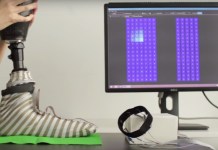As a part of research experiment, London scientists have fitted a unique number plate to hundreds of bees and they have been set free in to the air above east London on 21st June 2016.
Biologists from Queen Mary University of London (School of Biological and Chemical Sciences) have glued 500 bees with individually colored number plates and released them from the roof of the QMUL. This is the part of protect that aims to save the London Bees. The aim of the London Pollinator Project is to understand which parts of the capital are bee hotspots and find their favorite flowers.
Encouraging the people the university has announced awarding prizes of £100 vouchers to the Bee-spotters who take the best pictures of these special bees.
Red Grape-Orange Combo Can Strike Diabetes, Heart diseases and Obesity
“The fact that the bees have individual ‘licence plates’ will allow anyone interested to develop their own science project and ask scientific questions about the behaviour of bees,” said Professor Lars Chittka of Queen Mary University of London, which is leading the project.
“Citizen Scientists might be intrigued to see the same bee return to their balcony and might record when during the day, how many times and which flowers they prefer. They may be curious about what these regular visits tell us about a bee’s memory for places and why certain bees prefer particular color flowers.”
Londoners are urges to plant bee-friendly flowers that are rich in nectar and pollen. English Lavender, viper’s bugloss or spiked speedwell are few suggested plants. According to the QMUL news site, a new website is started as a part of the project, which helps people to learn “which flowers are most beneficial for bees and the best gardening methods to improve their chances of spotting a busy bee carrying a QMUL identification tag.”
Edinburgh University study on Red Squirrel Leprosy
“Britain’s bees are facing multiple threats, from loss of flower meadows and quiet places to nest, and from the many pesticides used in most modern farming,” said Professor Dave Goulson, a bee expert at the University of Sussex to Daily Telegraph.
“The good news is that we can all play a part in helping them. Making our gardens and allotments more friendly to bees is easy to do and can help make a real difference.”
“Once you view animals as individuals rather than anonymous entities, you develop a connection with them, and a deeper understanding of why it’s important to assist with the conservation of threatened animals,” added Project Leader Lars Chittka.














